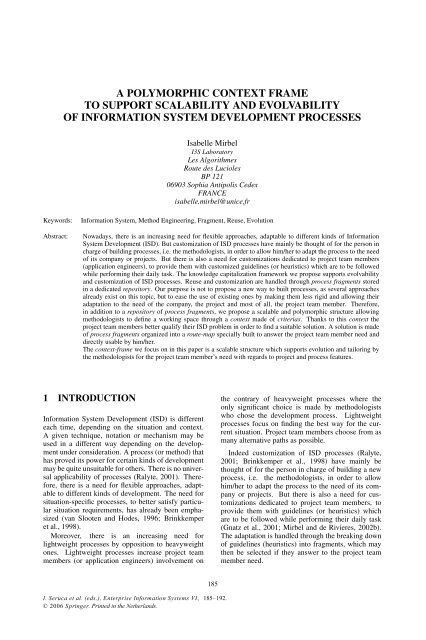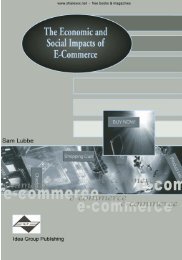Back Room Front Room 2
Back Room Front Room 2
Back Room Front Room 2
You also want an ePaper? Increase the reach of your titles
YUMPU automatically turns print PDFs into web optimized ePapers that Google loves.
A POLYMORPHIC CONTEXT FRAME<br />
TO SUPPORT SCALABILITY AND EVOLVABILITY<br />
OF INFORMATION SYSTEM DEVELOPMENT PROCESSES<br />
Isabelle Mirbel<br />
I3S Laboratory<br />
Les Algorithmes<br />
Route des Lucioles<br />
BP 121<br />
06903 Sophia Antipolis Cedex<br />
FRANCE<br />
isabelle.mirbel@unice.fr<br />
Keywords: Information System, Method Engineering, Fragment, Reuse, Evolution<br />
Abstract: Nowadays, there is an increasing need for flexible approaches, adaptable to different kinds of Information<br />
System Development (ISD). But customization of ISD processes have mainly be thought of for the person in<br />
charge of building processes, i.e. the methodologists, in order to allow him/her to adapt the process to the need<br />
of its company or projects. But there is also a need for customizations dedicated to project team members<br />
(application engineers), to provide them with customized guidelines (or heuristics) which are to be followed<br />
while performing their daily task. The knowledge capitalization framework we propose supports evolvability<br />
and customization of ISD processes. Reuse and customization are handled through process fragments stored<br />
in a dedicated repository. Our purpose is not to propose a new way to built processes, as several approaches<br />
already exist on this topic, but to ease the use of existing ones by making them less rigid and allowing their<br />
adaptation to the need of the company, the project and most of all, the project team member. Therefore,<br />
in addition to a repository of process fragments, we propose a scalable and polymorphic structure allowing<br />
methodologists to define a working space through a context made of criterias. Thanks to this context the<br />
project team members better qualify their ISD problem in order to find a suitable solution. A solution is made<br />
of process fragments organized into a route-map specially built to answer the project team member need and<br />
directly usable by him/her.<br />
The context-frame we focus on in this paper is a scalable structure which supports evolution and tailoring by<br />
the methodologists for the project team member’s need with regards to project and process features.<br />
1 INTRODUCTION<br />
Information System Development (ISD) is different<br />
each time, depending on the situation and context.<br />
A given technique, notation or mechanism may be<br />
used in a different way depending on the development<br />
under consideration. A process (or method) that<br />
has proved its power for certain kinds of development<br />
may be quite unsuitable for others. There is no universal<br />
applicability of processes (Ralyte, 2001). Therefore,<br />
there is a need for flexible approaches, adaptable<br />
to different kinds of development. The need for<br />
situation-specific processes, to better satisfy particular<br />
situation requirements, has already been emphasized<br />
(van Slooten and Hodes, 1996; Brinkkemper<br />
et al., 1998).<br />
Moreover, there is an increasing need for<br />
lightweight processes by opposition to heavyweight<br />
ones. Lightweight processes increase project team<br />
members (or application engineers) involvement on<br />
I. Seruca et al. (eds.), Enterprise Information Systems VI,<br />
© 2006 Springer. Printed in the Netherlands.<br />
185<br />
185–192.<br />
the contrary of heavyweight processes where the<br />
only significant choice is made by methodologists<br />
who chose the development process. Lightweight<br />
processes focus on finding the best way for the current<br />
situation. Project team members choose from as<br />
many alternative paths as possible.<br />
Indeed customization of ISD processes (Ralyte,<br />
2001; Brinkkemper et al., 1998) have mainly be<br />
thought of for the person in charge of building a new<br />
process, i.e. the methodologists, in order to allow<br />
him/her to adapt the process to the need of its company<br />
or projects. But there is also a need for customizations<br />
dedicated to project team members, to<br />
provide them with guidelines (or heuristics) which<br />
are to be followed while performing their daily task<br />
(Gnatz et al., 2001; Mirbel and de Rivieres, 2002b).<br />
The adaptation is handled through the breaking down<br />
of guidelines (heuristics) into fragments, which may<br />
then be selected if they answer to the project team<br />
member need.









